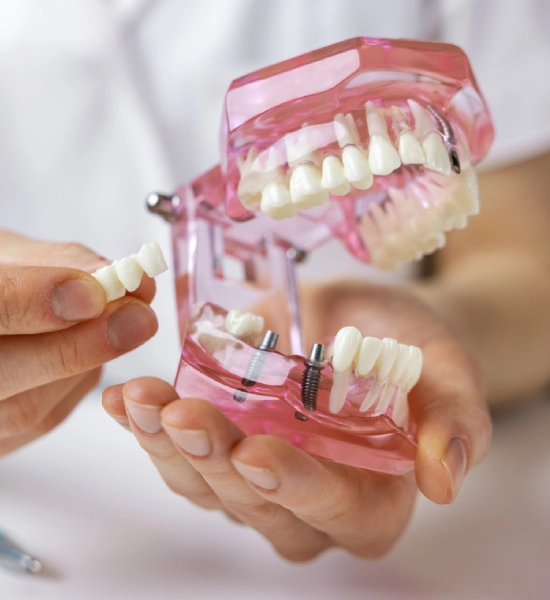Are you considering dental implants to restore your smile? While these modern solutions offer remarkable benefits, including natural-looking teeth and improved oral function, there’s a critical question to address: Can dental implants cause neurological problems?
Don’t let missing or broken teeth prevent you from smiling. Due to technological advancements, you can now easily restore your smile using dental implants. Dental implants are a cutting-edge alternative to missing teeth because they are surgically planted into your jawbone to replace missing tooth roots.
While dental implant procedures generally have a high success rate, it’s important to address concerns regarding potential neurological complications. Despite their effectiveness, some individuals may experience rare instances of nerve pain or other side effects associated with dental implants.
In this blog, we detail these topics and seek answers to pressing questions such as: Can dental implants cause neurological problems? Let’s explore further to comprehensively understand the relationship between dental implants and neurological health.

Advantages of Dental Implants
- Enhanced aesthetic appeal
- Increased self-confidence
- Improved functionality in activities like eating and speech
- Longevity and ease of use
Understanding the Impact of Dental Implants
- Managing Pain and Discomfort: Patients often experience discomfort after implant surgery, which can be effectively managed with prescribed pain relief medications. Natural healing processes typically alleviate this discomfort over time.
- Addressing Swelling and Bruising: Swelling and bruising around the implant site are normal occurrences following surgery and generally subside within a few days, facilitating a speedy recovery.
- Preventing Infection and Ensuring Healing: Infection risk is a concern in any surgical procedure. Dental professionals emphasize the importance of post-surgical care to promote optimal healing and prevent infections.
Relationship Between Dental Implants and Nerve Health
What is a Nerve Damage?
Nerve damage caused by dental implants refers to different levels of numbness, pain, or tingling sensations in your mouth, including your natural teeth, gums, lips, or chin.
It happens when dental professionals drill the implant too deeply into the lower jaw, potentially injuring the underlying inferior alveolar nerve. Unfortunately, such nerve injuries can be quite painful, and the damage is often permanent.
Signs of Nerve Damage Caused by Dental Implants
- Numbness
- Pain
- Tingling
- Burning sensations in the chin, lips, and gums
- Drooling
- Impaired speech
The Impact
Inferior alveolar nerve injury can result from local anesthesia, third molar surgery, dental implant insertion, and other endodontic procedures. This type of injury is more severe than lingual nerve trauma and demands prompt attention and care, sometimes necessitating a root canal.
Can Dental Implants Cause Neurological Problems?
As you may be aware, dental implant surgery entails inserting a titanium post into the jawbone to replace the tooth root. Following the fusion of the implant with the jawbone, a crown is added for a natural appearance and function.
During the procedure, excessive drilling in the lower jaw may potentially harm the “inferior alveolar nerve,” causing issues like numbness, tingling, pain, and other symptoms. Even with prompt treatment, such injuries can be permanent.
Nerve damage can also occur post-implantation. For instance, the implant fixture might compress a nerve or post-surgery bruising and swelling could exert pressure on nerves. In many cases, these nerve injuries can gradually heal over time.
When Should You Consider Zirconia Dental Implants Instead of Titanium?
- Concerns About Neurological Issues: If you harbor concerns about potential neurological problems linked to dental implants, it's natural. However, it's crucial to note that there is currently no strong evidence implicating dental implants in such issues.
- Metal Sensitivities: For those with known sensitivities to metal, zirconia implants offer a viable alternative. Many dentists are adept at using zirconia, making it a suitable choice.
- Preference for Zirconia: If you favor the idea of zirconia implants over titanium, it's worth considering. Nonetheless, it's important to acknowledge that titanium implants have undergone more extensive research regarding their long-term durability.
Preventive Steps to Guard Against Neurological Issues
- The Importance of Expertise: The expertise of oral surgeons and implant dentists is crucial in mitigating nerve-related complications. Their skill in performing safe and precise surgeries prioritizes patient comfort and well-being.
- Encouraging Professional Consultation: Prospective dental implant recipients should seek consultation with experienced dental professionals. Open discussions about potential risks and benefits empower individuals to make informed decisions. In case of suggestive nerve-related symptoms post-implant surgery, seeking immediate dental attention is crucial.
- Beyond Neurological Considerations: While this article focuses on neurological dimensions, it's essential to understand various aspects of dental implant strategies. Factors including operative care, oral hygiene maintenance, and regular brushing impact the durability and success of dental implants.
Conclusion
While exploring “Can Dental Implants Cause Neurological Problems?” sheds light on potential implications for nerve health, it’s vital to recognize the risks involved, including the rare chance of nerve damage. Prioritizing informed decisions, seeking professional guidance, and maintaining oral hygiene are key to safeguarding dental health and overall well-being.
Ready to address your dental concerns and explore treatment options? Contact All About Smiles in Canton, MI, today to schedule your appointment and discuss your dental implant needs. New patients can call (734) 531-7638, while existing patients can reach us at (734) 981-1199. Take the first step towards achieving optimal oral health and confidently restoring your smile!







